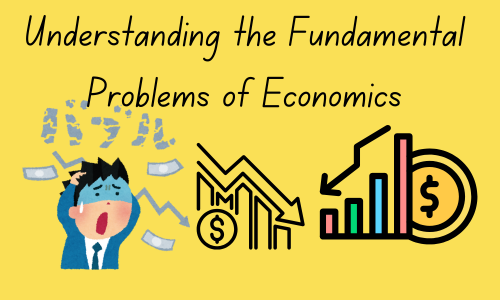This site may contain links to affiliate websites, and I may earn a commission for any purchases made through those links at no additional cost to you.

Understanding the Fundamental Problems of Economics
Economics is all about decision-making—how individuals, businesses, and governments allocate scarce resources to meet unlimited wants. Since resources are limited, every economy must solve fundamental economic problems. In this article, we’ll break down the three basic problems of economics, explore the most common economic problem, and discuss the five big questions that shape economic systems—with real-world examples.
The 3 Basic Problems of Economics
Every economy, whether capitalist, socialist, or mixed, must solve these three fundamental problems:
- What to Produce?
- Should a country focus on producing more consumer goods (clothes, cars, electronics) or capital goods (machinery, factories)?
- Should more resources be allocated to luxury goods or necessities like food and housing?
- In times of war, should a country prioritize military production or social programs?
- How to Produce?
- Should goods be produced using labor-intensive methods (more human workers) or capital-intensive methods (more machines and technology)?
- Should a business produce locally or outsource to another country where labor is cheaper?
- What impact does production have on the environment? Should companies focus on sustainability?
- For Whom to Produce?
- Who gets access to the goods and services produced—should they be distributed based on market demand or government policies?
- Should healthcare be provided for free, or should people pay for it?
- How does income inequality affect access to necessities like food, education, and housing?
The Most Common Problem in Economics: Scarcity
The biggest challenge in economics is scarcity—the fact that resources like land, labor, and capital are limited, while human wants are unlimited. This forces individuals, businesses, and governments to make trade-offs.
For example:
- If a government spends more on military defense, it may have less to spend on healthcare and education.
- If a company invests in developing new technology, it may have less to spend on marketing and advertising.
- If a person chooses to spend money on travel, they may have to cut back on saving for retirement.
The 5 Big Questions of Economics (with Examples)
Different economic systems (capitalism, socialism, mixed economies) exist to answer five key questions:
- What will be produced?
- In a market economy, production is determined by consumer demand (e.g., more smartphones and electric cars).
- In a command economy, the government decides (e.g., the Soviet Union focused on industrial production).
- In a developing country, should more land be used for food crops or cash crops for export?
- How will goods and services be produced?
- Should companies use automation and AI or rely on human labor?
- Should a country prioritize renewable energy (solar, wind) or fossil fuels?
- Should companies outsource manufacturing to lower-cost countries or produce locally?
- Who will get the output?
- In capitalist economies, income determines access (e.g., people with higher salaries afford better healthcare and education).
- In socialist economies, the government may distribute resources (e.g., free healthcare in Scandinavian countries).
- Should basic needs like water, electricity, and the internet be available to everyone, or only those who can afford them?
- How will the system accommodate change?
- How quickly can an economy adapt to a financial crisis (e.g., stimulus checks during recessions)?
- How do businesses adjust to new consumer trends (e.g., the rise of remote work post-pandemic)?
- How does society prepare for job losses due to automation?
- How will the system promote progress?
- Should governments invest in education and research to drive innovation?
- Should companies focus on profits or social responsibility?
- How should economies balance economic growth with environmental sustainability?
Final Thoughts
Economics isn’t just about numbers—it’s about making smart choices with limited resources. Whether you’re a business owner, policymaker, or just someone managing personal finances, understanding these basic economic principles can help you make better financial decisions.
Would you like to see more economic breakdowns like this? Let us know in the comments!




